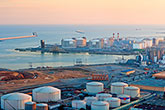Korean Register releases cryogenic insulation materials guide
Published by Oliver Kleinschmidt,
Editorial Assistant
Tanks and Terminals,
Korean Register has published the 'Guide to Selection of Thermal Properties of Cryogenic Insulation Materials' for safe storage of cryogenic fuels, including LNG and liquid hydrogen.
In 2023, the International Maritime Organisation (IMO) adopted the '2023 Greenhouse Gas Strategy' with the goal of achieving carbon neutrality in international shipping by 2050. The strategy aims to reduce greenhouse gas emissions by at least 20%, striving for 30%, by 2030, at least 70%, striving for 80%, by 2040, and to achieve net-zero emissions by around 2050.
In response to these increasingly stringent environmental regulations, the maritime industry is focusing not only on the widely used LNG but also on the long-term use of alternative fuels such as hydrogen and ammonia. In particular, there is a rising emphasis on insulation system technology to ensure the safe and efficient storage of cryogenic low and zero carbon fuels.
Representative cryogenic fuels include LNG and liquid hydrogen. Hydrogen is a liquid below its boiling point of -253°C, which is about 90°C lower than the boiling point of LNG at -162°C, requiring advanced insulation technology. Since liquefied hydrogen reduces its volume by about 800 times compared to its gaseous state, securing stable storage technology on ships would enable the affordable import and utilisation of hydrogen through marine transport, while also facilitating the implementation of Republic of Korea's Hydrogen Economy Roadmap (2019).
To develop insulation system technology that is essential for the use of cryogenic low and zero carbon fuels, KR partnered with researchers from the Korea Institute of Machinery & Materials (KIMM), Pusan National University (PNU), and the Seoul National University of Science and Technology (SEOULTECH) to publish the report.
The report describes the insulation system used in ships for -162°C LNG and -253°C liquefied hydrogen, and analyses environmental factors influencing the heat transfer mechanisms of the system and other design elements.
KIM Daeheon, Executive Vice President of KR's R&D Division, stated, "This technical guide is expected to serve as the standard for material selection during the design of insulation systems in cryogenic environments or the development of innovative insulation systems. KR will continue to provide alternative fuel technology services, driving decarbonisation of the maritime sector and aligning with evolving maritime technology through various R&D activities.”
The document can be downloaded via the link here.
Click here for free registration to Dry Bulk
Read the article online at: https://www.tanksterminals.com/product-news/22052024/korean-register-releases-cryogenic-insulation-materials-guide/
You might also like
Higher LNG prices to limit Asian demand and turbocharge European gas storage levels
A Wood Mackenzie report has suggested that European gas storage could hit 100% by end of September 2024.

